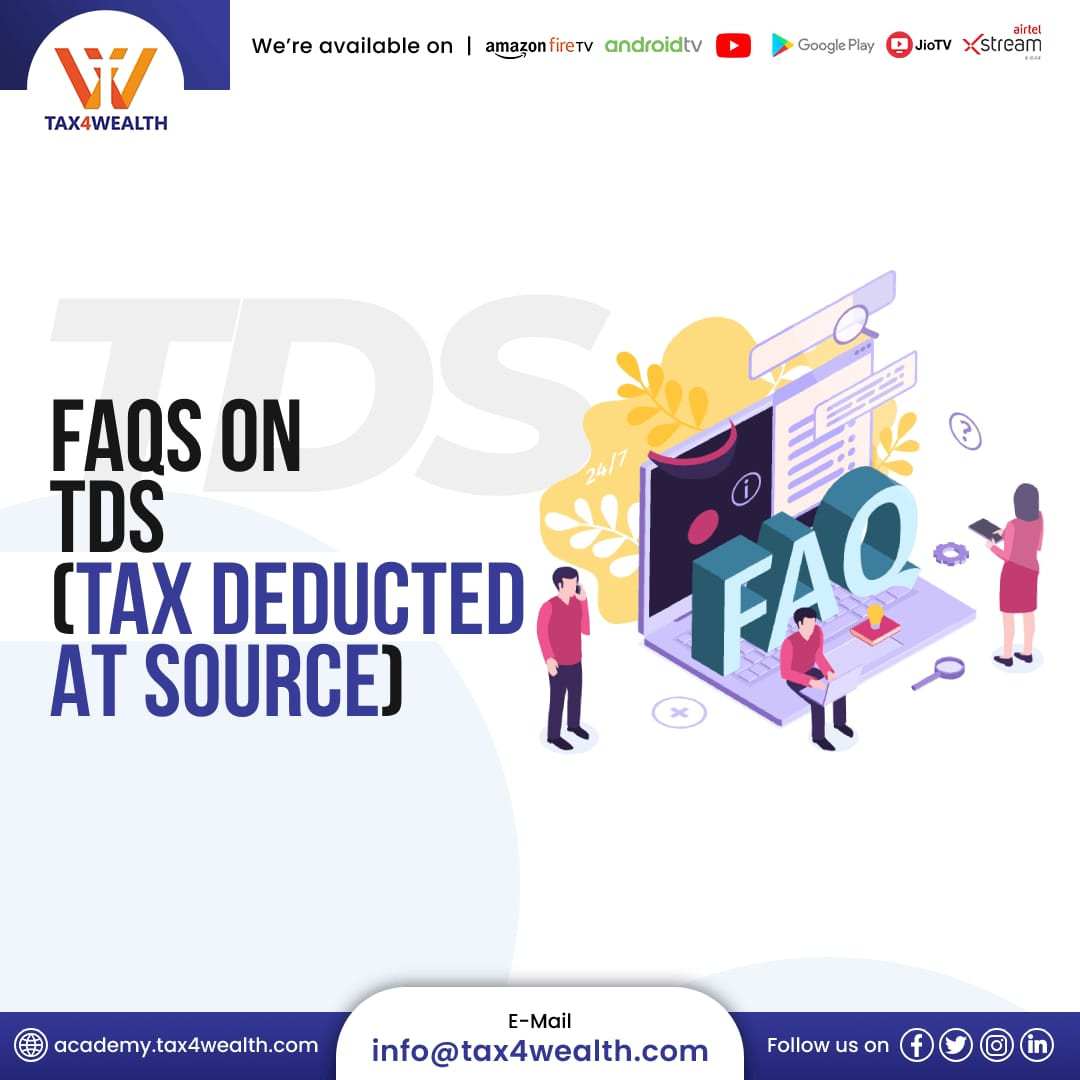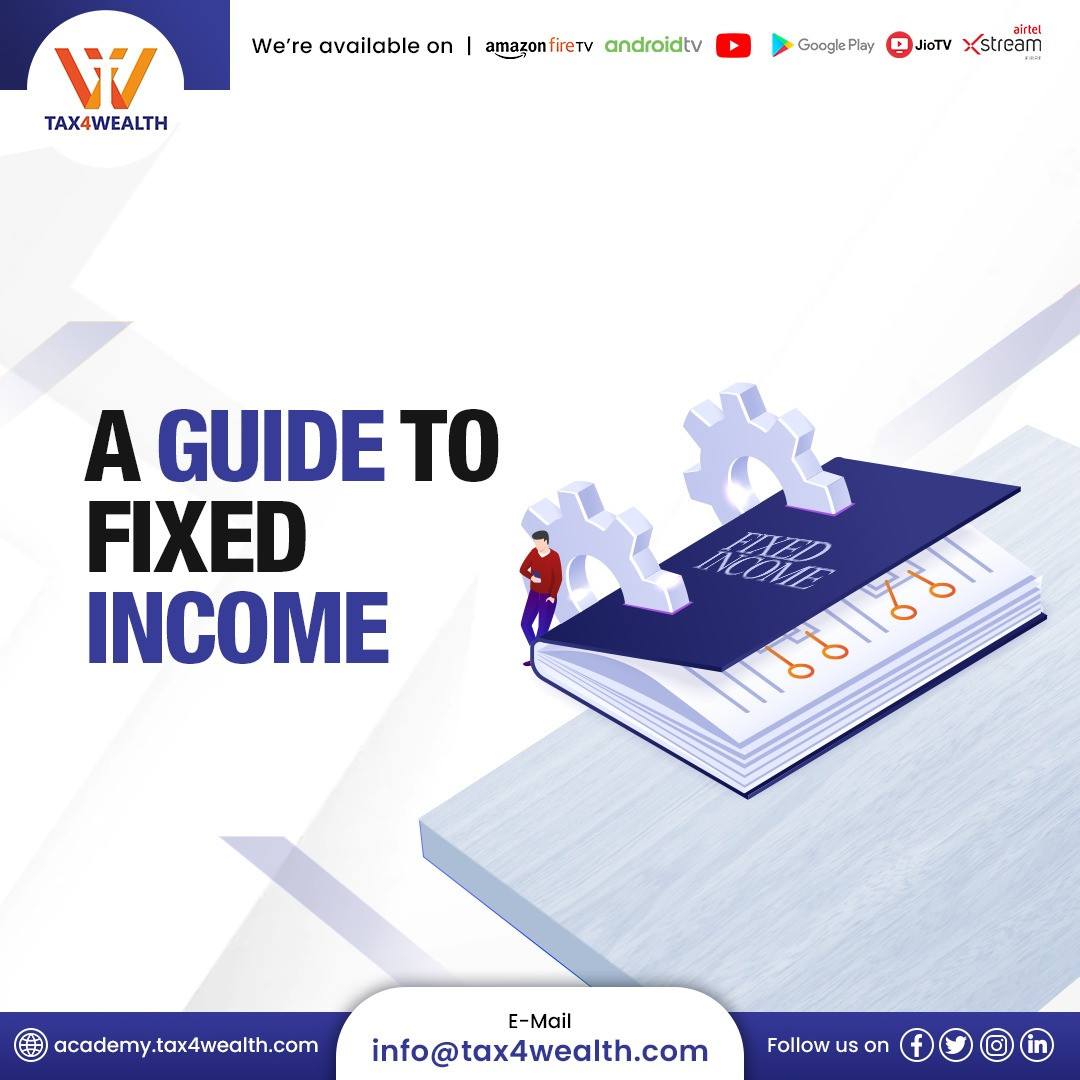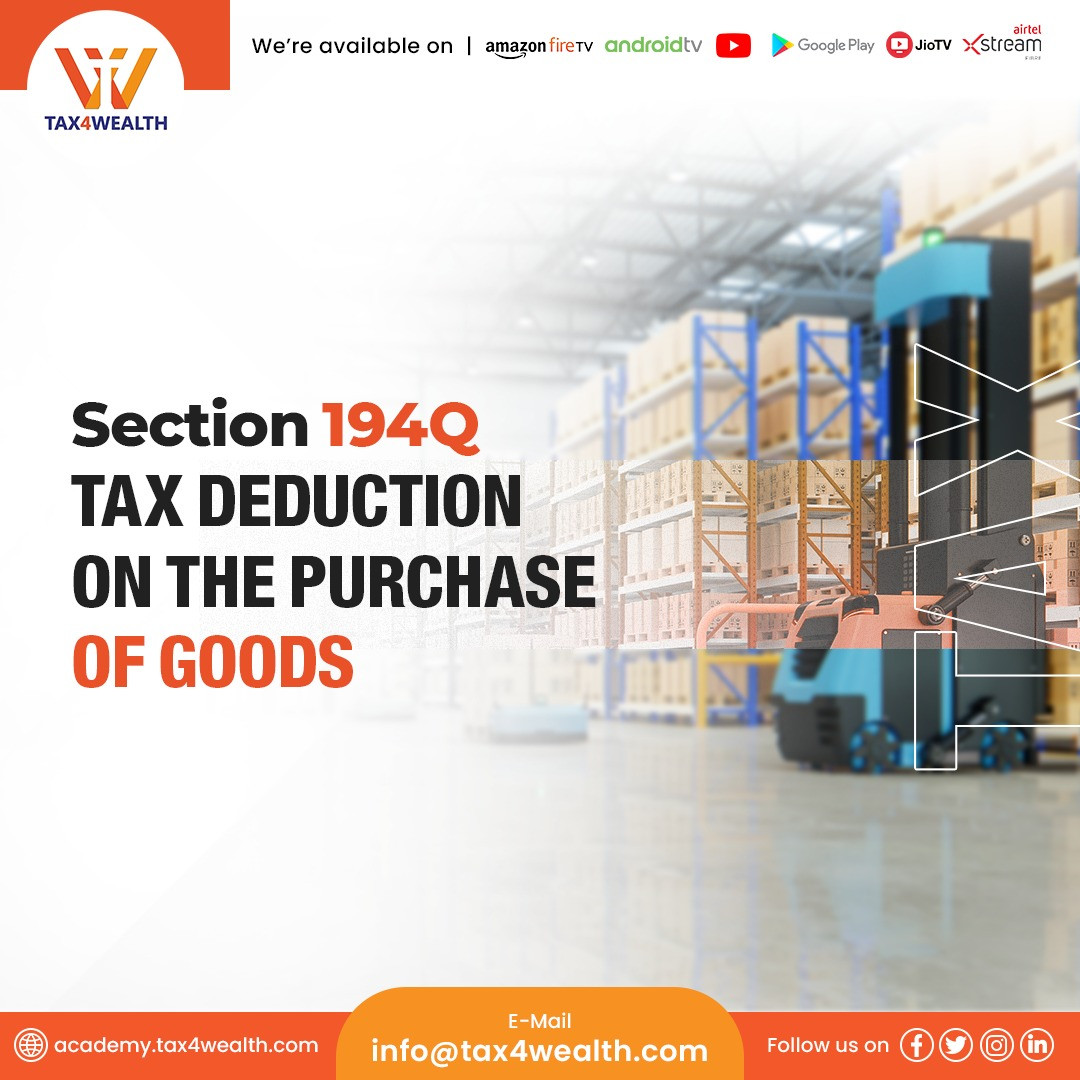
FAQs on TDS (Tax Deducted at Source)
Tax Deducted at Source (TDS) is a system implemented by tax authorities in many countries to collect taxes at the source of income. It is a mechanism where a certain percentage of payment is deducted by the payer and remitted to the government as tax before the remaining amount is paid to the recipient. TDS plays a significant role in the taxation process, and it is important for individuals and businesses to have a clear understanding of its implications.
In this blog, we will explore some frequently asked questions (FAQs) on TDS to help you grasp its key aspects.
Q1. What is TDS?
Ans. TDS, is a method of collecting taxes at the source of income. It is applicable to various types of payments such as salaries, interest, rent, commissions, and professional fees, among others. The person making the payment deducts a certain percentage as tax and remits it to the government on behalf of the recipient.
Q2. Who is responsible for deducting TDS?
Ans.The responsibility of deducting TDS lies with the person making the payment, also known as the "deductor." The deductor can be an individual, a company, or any entity making payments subject to TDS.
Q3. What is the purpose of TDS?
Ans. The main objective of TDS is to ensure a regular inflow of tax revenues to the government throughout the year. By deducting tax at the source, the government can prevent tax evasion and improve tax compliance. TDS also simplifies the tax collection process by distributing the responsibility of tax deduction among various entities.
Also read; TDS and TCS Return Due Dates for The FY 2022–2023
Q4. Is there a minimum threshold below which tax deductions do not apply?
Ans: The minimum threshold below which the tax deductions do not apply are shown in the table below:-
|
S.No. |
Particulars |
Section |
Threshold limit |
|
1. |
No deduction of tax at source from salaries |
192 |
If net taxable income is less than the maximum amount which is not chargeable to tax (i.e. Rs. 2,50,000 for an individual other than senior citizen, Rs. 3,00,000 for Senior Citizens and Rs. 5,00,000 for Super Senior Citizens) |
|
1A. |
No TDS from payment of accumulated balance of provident fund account due to an employee |
192A |
If taxable premature withdrawal amount is less than Rs. 50,000. |
|
2. |
No TDS from interest paid on debentures issued by a company in which public are substantially interested. Provided interest is paid by account payee cheque to resident individual or HUF |
193 |
If amount of interest paid during the financial year does not exceed Rs. 5,000 |
|
3. |
No TDS from interest paid on 8% Saving (Taxable) Bonds 2003 or 7.75% Savings (Taxable) Bonds, 2018 (applicable from A.Y 2019-20) to resident persons |
193 |
If amount of interest paid or likely to be paid during the financial year does not exceed Rs. 10,000 |
|
3A. |
No TDS from interest on 6.5% Gold bonds, 1977 or 7% Gold bonds, 1980 paid to resident individual |
If bonds held by other than non-resident individual (or behalf of any other person) and makes declaration to the payer that the nominal value of such bonds does not exceed Rs. 10,000 at any time during the period to which interest relates. |
|
|
4. |
No TDS from dividend paid by Indian company by an account payee cheque to individual |
194 |
If aggregate amount of dividend paid or credited during the financial year does not exceed Rs. 5000. |
|
5. |
No TDS from interest other than on securities paid by a banking company or co-operative society engaged in carrying on the business of banking |
194A |
If amount of interest paid or credited on time deposit during the financial year exceeds Rs 10,000 (*) (for all type of payee)/Rs 50,000 (from 01/04/2018 if payee is resident senior citizen) |
|
6. |
No TDS from interest on any deposit with a post office under Senior Citizens Saving Scheme Rules, 2004( Notified scheme) |
194A |
If amount of interest paid or credited on time deposit during the financial year exceeds Rs 10,000 (*) (for all type of payee)/Rs 50,000 (from 01/04/2018 if payee is resident senior citizen) |
|
7. |
No TDS from interest other than on securities if payer is any other person other than post office or banking company or co-operative society engaged on the banking. |
194A |
If amount of interest paid or credited on time deposit during the financial year exceeds Rs 5,000. |
|
8. |
No TDS from Lottery / Cross Word Puzzles /Card game/gambling/betting of any form or nature |
194B |
If amount paid during the financial year does not exceed Rs. 10,000. |
|
9. |
No TDS from winnings from horse races |
194BB |
If amount paid during the financial year does not exceed Rs. 10,000. |
|
10. |
No TDS to contractor to resident person |
194C |
a) If sum paid/credited to a contractor in a single payment does not exceed Rs. 30,000 b) If sum paid/credited to contractor in aggregate does not exceed Rs. 1,00,000 during the financial year (Rs. 1,00,000 w.e.f. 01/06/2016) |
|
11. |
No TDS from insurance commission paid or payable during the financial year to resident person |
194D |
If amount paid or credited during the financial year does not exceed Rs. 15,000 |
|
12 |
No TDS from sum payable under a life insurance policy (including bonus) to a resident person (w.e.f. 01-10-2014) |
194DA |
If amount paid or payable during the financial year is less than Rs. 1 lakh. |
|
13. |
No TDS from payments made out of deposits under NSS |
194EE |
If amount of payment or aggregate amount of payments in financial year is less than Rs. 2,500. In case of payment is received by legal heirs no tax shall be deducted. |
|
14. |
No TDS from commission paid on sale of lottery tickets |
194G |
If amount of income the financial year does not exceed Rs. 15,000 |
|
15. |
No TDS from payment of commission or brokerage |
194H |
If amount paid or credited during the financial year does not exceed Rs. 5,000 (Rs. 15,000 w.e.f. 01/06/2016). Further no tax to be deducted from commission payable by BSNL/ MTNL to their Public call office franchisees. |
|
16. |
No TDS on payment of rent in respect of any land or building, furniture or fittings or plant and machinery to a resident person |
194-I |
If amount paid or credited during the financial year does not exceed Rs. 1,80,000 (Rs. 2,40,000 w.e.f. 01/04/2019). No tax deductions shall be made under this section if rent is paid to a business trust, being a real estate investment trust, in respect of any real estate asset, referred to in 10(23FCA), owned directly by such business trust. |
|
17. |
No TDS on payment of consideration for purchase of an immovable property(other than agriculture land) to a resident transferor |
194-IA |
If consideration paid or payable for transfer of an immovable property is less than Rs. 50 Lakhs. |
|
17A. |
No TDS on payment of rent of any land or building or both by an individual/HUF [whose books of account are not required to be audited under section 44AB to resident person. |
194-IB |
If amount of rent does not exceed Rs. 50,000 for a month or part of a month. |
|
18. |
No TDS on payment of fee for professional services, fee for technical services, royalty, any sum referred to in section 28(va) to a resident person |
194J |
If amount paid or credited during the financial year does not exceed Rs. 30,000 . |
|
19. |
No TDS from income in respect of units payable to resident |
194K |
If the amount of income paid or payable exceeds Rs. 5,000 during the financial year . |
|
20. |
No TDS on payment of compensation/enhanced compensation on compulsory acquisition of immovable property (other than Agricultural Land) to a resident person |
194LA |
If such sum amount does not exceed Rs. 2,50,000 during a financial year. |
|
21. |
No TDS is required to be deducted on sum payable to a person with respect to contractual work, commission, brokerage or for professional services |
194M |
If the aggregate amount paid or credited during the financial year does not exceed Rs. 50 lakhs |
|
22. |
No TDS is required to be deducted on the amount withdrawn in cash from any account |
194N |
If the aggregate amount withdrawn does not exceed Rs. 1 crore during the previous year. |
|
23. |
No TDS from payment to participants of e-commerce |
194-O |
If amount paid or payable Resident Individual or HUF during the financial year does not exceed Rs. 5 Lakhs |
|
24. |
No TDS on sum paid to seller for purchase of goods |
194Q |
If sum paid to seller for purchase of goods doesn’t exceeds Rs. 50 lakh |
|
25. |
No TDS in case any benefit or perquisite is provided to a resident |
194R |
If aggregate value of benefit/perquisite provided during the Financial Year doesn’t exceed Rs. 20,000 |
|
26. |
No TDS from payment on transfer of Virtual Digital Asset |
194S |
No tax shall be deducted under this provision in the following circumstance: • If the consideration is payable by any person (other than a specified person) and its aggregate value does not exceed Rs. 10,000 during the financial year. • If the consideration is payable by a specified person and its aggregate value does not exceed Rs. 50,000 during the financial year. Specified person means: (a) An individual or a HUF, whose total sales, gross receipts or turnover does not exceed Rs. 1 crore in case of business or Rs. 50 lakhs in case of a profession, during the financial year immediately preceding the financial year in which virtual digital asset is transferred; (b) An individual or a HUF who does not have any income under the head profits and gains of business or profession. |
Q5. How is the TDS rate determined?
Ans. The TDS rates are prescribed by the tax authorities and may vary depending on the nature of the payment and the provisions of the tax laws. Different rates are applicable for different types of payments, and it is essential to refer to the relevant provisions and notifications issued by the tax department to determine the applicable rate.
Q6. Can TDS be adjusted against the final tax liability?
Ans. Yes, TDS can be adjusted against the final tax liability of the recipient. When Filing ITR, the recipient can claim the TDS amount as a credit against their total tax liability. If the TDS amount exceeds the tax liability, the recipient may be eligible for a tax refund.
Q7. Is TDS applicable to all types of payments?
Ans. No, TDS is not applicable to all types of payments. The tax laws specify the types of payments subject to TDS. Common examples include salaries, interest on fixed deposits, rent, professional fees, and contract payments. It is important to consult the relevant provisions and seek professional advice to determine whether TDS applies to a particular payment.
Q8. What can be done if the TDS credit is not reflected in Form 26AS?
Ans. If the TDS credit is not reflected in Form 26AS, there are several possible reasons for this. These include the payer not filing the TDS statement, or the deductee's PAN (Permanent Account Number) being incorrectly quoted in the TDS statement filed by the payer. To address this issue, the payee should contact the payer to determine the specific reasons for the non-reflection of the TDS credit in Form 26AS.
Q9. What are the consequences of non-compliance with TDS provisions?
Ans. Non-compliance with TDS provisions can result in penalties and interest charges. If a deductor fails to deduct TDS or fails to deposit the deducted amount to the government, penalties can be imposed. Additionally, interest may be levied for delayed or non-payment of TDS.
Q10. What are the consequences of non-compliance with TDS provisions?
Ans.Non-compliance with TDS provisions can result in penalties and interest charges. If a deductor fails to deduct TDS or fails to deposit the deducted amount to the government, penalties can be imposed. Additionally, interest may be levied for delayed or non-payment of TDS.
Q11. How can I verify the TDS amount deducted from my income?
Ans. The deductor is required to issue a TDS certificate to the recipient, providing details of the TDS deducted. These certificates are commonly known as Form 16 (for salaried individuals) and Form 16A (for non-salaried individuals). By referring to these certificates, individuals can verify the TDS amount deducted and ensure accurate reporting of their income.
For more information, Visit us at: https://academy.tax4wealth.com/
No comments yet, Be the first to comment.













